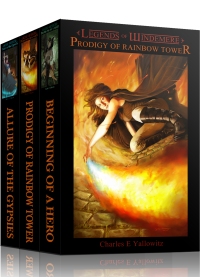
Yahoo Image Search
I’ve said in previous posts that one of the most important parts of concluding a series is creating closure. You need to bring things to an end, which isn’t as easy as some people think. In fact, one of the reasons it can be so tough is because you have a variety of closure types to choose from. It depends a lot on what you’re going for, but even planning doesn’t alleviate all the pressure. So, what are the types?
- Classic Good Ending– All of the good guys get what they wanted and all of the bad guys got what they deserved. It’s the oldest type of closure in the book. Nothing messy and no risk of people feeling it’s a downer. Though, you might get called out for being weak and unoriginal.
- Classic Bad Ending– I’m not sure how long it took for someone to write the first story where the bad guys win, but I wouldn’t be surprised if it was the second type of closure ever made. All of the bad guys get what they wanted and all of the good guys get nothing they deserved. Darkness reigns and you leave the audience feeling a little down. You might also get a few angry readers who feel like they just wasted their time investing in characters that were destined to lose.
- One Stage Ends, Another Begins– This one is more complicated and works best when you’re going to start a new series with the same characters. The first adventure ends with a sense of closure and the heroes move on. Some of them head off into the sunset in search of the next adventure like how Mad Max finishes his adventure and leaves right after. Other times the hero might retire and be brought back for a new quest that is remotely connected. Another twist on this one is when the villain finds a way to return and battle a new batch of heroes. This one certainly has more variety than 1 and 2.
- Everyone Dies!– Not a positive one since it means you wipe everyone out, which may even include the villain. Basically, you decimate the entire cast and leave no question about it being over.
- The Sacrifice– It’s rather self-explanatory and requires a build up. At the very least some foreshadowing. This is when a hero, either main or supporting, ends the series by making a sacrifice. Now, I’m putting this one in a separate category because it is not always an obvious choice. There’s is a big difference between Spock sacrificing himself to save the ship and Gollum inadvertently sacrificing himself to destroy the One Ring. Both acts bring an end to the overall quest, but the motivations are much different and require that you make it work for the character in question.
- Failure in Victory– Hard to explain this one. Basically, the heroes succeed in their quest, but find that doing so actually makes the world worse. Maybe killing that dragon cleared the path for a demon that feared it. Perhaps choosing one love interest results in a life of misery before divorce. The protagonists do get what they want, but then it’s revealed that it isn’t as good as they expected.
- Trauma– Another easy one to figure out. The heroes win, but they aren’t coming out in one piece. It could be that they are in a coma, missing some body parts, amnesia, or any number of possible afflictions. You still get closure with the heroes winning, but it comes with a major downside. It brings into question if some quests are worth taking if you don’t come out intact or even get to reap the rewards.
- Mixed Bag– This works for ensemble casts where every character gets a different type of closure. Some live happily ever after, others die in the finale, and then you have those that are in-between. By that, I mean some live, but not happily ever after. This is a tough one to pull off if every character has fans. Nobody wants their favorite to get the bad ending, but you can’t always rationalize everyone surviving. Especially if the final part is a big battle.





Excellent recap, Charles. I should keep this on my desk and reference the possibilities.
LikeLike
Thanks. Helped myself out by writing the post.
LikeLiked by 1 person
😀
LikeLike
Thanks for this great information, Charles.
LikeLike
You’re welcome.
LikeLike
Great breakdown. Very helpful.
LikeLike
Glad you enjoyed it.
LikeLike
I like the one stage ends, another begins idea. It leaves the writer/reader open to future possibilities. Great post, Charles!
LikeLike
Thanks. That method of closure does help with a series, but I’ve found that it’s fairly risky when ending a story. Mostly because an author needs to have something for the new beginning part.
LikeLiked by 1 person
In my series I have a lot of secondary characters who tell me they would like a story of their own one day 🙂
LikeLike
Only one secondary character in my series stepped up for a stand alone. The others didn’t really have enough or their stories are ending alongside the champions.
LikeLiked by 1 person
Reblogged this on Chris The Story Reading Ape's Blog and commented:
If you can think of any more story closure scenarios, let Charles know on his original blog post 😎
LikeLike
Thanks for the reblog. 😀
LikeLiked by 1 person
Welcome, Charles 👍😃
LikeLike
Thanks Charles … I’ve three characters, one man, two women, and while not my original intention I can now see I’m heading for a mixed bag ending which will need to be handled with care! Eric.
LikeLike
You’re welcome. I’m noticing that I gravitate towards mixed bag endings due to always having a group. Honestly, I find it more relaxing because I can create an ending for every type of reader. Pessimists get downfalls and optimists get happily ever after.
LikeLiked by 1 person
Great list! I can think of stories that fit each one.
I don’t mind number 5 as long as there is a greater meaning to the loss of life. SPOILERS FOR ANYONE WHO HASN’T SEEN ROGUE ONE: I can’t help thinking of Rogue One. Everyone who took the mission knew what he or she was getting himself/herself into. The sacrifice of life for the greater good was deemed necessary. END SPOILERS
LikeLike
The Sacrifice is fairly classic. You have it with Boromir and Gandalf as well as Aslan. Though two of those guys came back. Pretty sure it’s been in mythology as well like Prometheus sacrificing his freedom to give mankind fire. Rogue One was an odd movie because they really had to figure out how to explain that none of those heroes showed up in the originals. This is why prequels can be such a pain.
LikeLiked by 2 people
I agree, which has been the issue with Star Wars, particularly shows like Rebels. It’s hard to root for characters we think will die before the show ends.
LikeLike
Sounds like the cartoons and newer movies really threw the mythos out of whack. I always thought the original EU was more organized and in synch.
LikeLike
Great post on something that all writers should take into consideration when ending a novel. During the ending to my second novel, I was unsure of my ending and at the last minute changed it and made the ending not sad, but not happy either. Later, I realized I had made a huge mistake and changed it to a very happy ending and it is now a second edition. I am not saying anything about my new published book – no spoilers. Karen 🙂
LikeLike
Thanks. I’ve been tempted to do the sudden changes out of fear. For some reason, I keep thinking I’m missing something or making a mistake when it comes to endings. Did you get any feedback on the ending before the change?
LikeLike
Yes, from my family, that other wise love the story. I guess it was my ambiguity, my self doubt and fear that rationalized a middle of the road ending was my best bet and it really was my worse instinct. Since then, it is greatly repaired, but still far from the perfect ending. I think I just lost the thread of what I wanted to say. Yet, the first 3/4th of the book are lovely or so I am told. I have since learned my lesson. Thank you for a great comment and a great post that is so relevant for writers today. Karen 🙂
LikeLike
We always seem to be our worst critics. I did something similar with my first book. Took the advice from everyone who offered and it made a mess. I spent about 5 years fixing it after friends told me it was utter chaos.
LikeLiked by 1 person
I can relate!! I decided that one fix, however, poorly mended, would just have to live with it. It is comforting to know someone else has suffered through the same thing – a shared conundrum. Karen 🙂
LikeLike
I’ve met many authors that made that mistake early on. Some fix it and others scrap the idea.
LikeLike
Great post. Bookmarking!
LikeLike
Thanks. Happy to see this post help a lot of people.
LikeLiked by 1 person
I’m a fan of #1, but with some sort of surprise to elevate it.
One time I wrote an ending where the MCs got what they were fighting for but one collaborating villain ended up keeping some of his ill gotten gains. Had a few complaints about that.
LikeLike
Surprises are always a good way to go with any ending. 😁 Interesting twist on that one I’m guessing the villain wasn’t the main one. I’ve seen a few stories where a henchman or secondary villain escapes with their own goals. Sorry about the complaints.
LikeLiked by 1 person
Hey, at least I know someone read the book!
LikeLike
Good point
LikeLiked by 1 person
Reblogged this on Author Don Massenzio and commented:
Check out this great post from Charles Yallowitz from his Legends of Windemere blog on the different types of closure
LikeLike
Thanks for the reblog.
LikeLiked by 1 person
You’re welcome.
LikeLike
Reblogged this on sherriemiranda1 and commented:
Are you writing a novel? Do you know what the ending will be? Suggestion: Have a clear idea of the ending AND WRITE IT before editing. JMHO! 😉 ❤
Peace, love & happy writing to all,
Sherrie
Learn the story behind: Publish “Crimes and Impunity in New Orleans.” and help us meet our goal. @indiegogo
https://igg.me/at/CrimesImpunityNOLAnovel/88562
Sherrie Miranda’s historically based, coming of age, Adventure novel “Secrets & Lies in El Salvador” will be out en Español very soon! It is about an American girl in war-torn El Salvador:
http://tinyurl.com/klxbt4y
Her husband made a video for her novel. He wrote the song too.
You can watch it on YouTube or go to my home page:
https://sherriemiranda1.wordpress.com
LikeLike
Thanks for the reblog.
LikeLike
Reblogged this on When Angels Fly.
LikeLike
Thanks for the reblog
LikeLiked by 1 person
Welcome Charles!
LikeLike
Reblogged this on Writer's Treasure Chest and commented:
Charles Yallowitz provides us with a post on his blog “Legends of Windermere”, describing different types of closure. I love the article. Thank you, Charles.
LikeLike
Thanks for the reblog. Glad you enjoyed it. 😁
LikeLiked by 1 person
It’s been my pleasure. I definitely did enjoy it. It’s a great post!
LikeLiked by 1 person
One bad closure is having the door slammed on your finger. Seriously though for me there is something wrong about and ending that wraps up a 600 page novel in the last paragraph or two.
LikeLike
Sorry for the delay. This ended up in spam. I’m with you on that brief closure after such a long adventure. Even though it’s an ending, it really shouldn’t be rushed or forced.
LikeLike